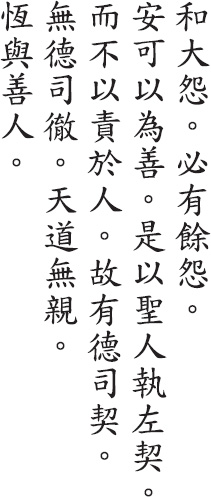79
 |
In resolving a great dispute a dispute is sure to remain how can this be good sages therefore hold the left marker and make no claim on others thus the virtuous oversee markers the virtueless oversee taxes the Way of Heaven favors no one but it always helps the good |
TE-CH’ING says, “In Lao-tzu’s day, whenever the feudal rulers had a dispute, the most powerful lord convened a meeting to resolve it. But the resolution of a great dispute invariably involved a payment. And if the payment was not forthcoming, the dispute continued.”
WANG PI says, “If we don’t arrange a contract clearly and a dispute results, even using virtuous means to settle it won’t restore the injury. Thus, a dispute will remain.”
SU CH’E says, “If we content ourselves with trimming the branches and don’t pull out the roots, things might look fine on the outside, but not on the inside. Disputes come from delusions, and delusions are the product of our nature. Those who understand their nature encounter no delusions, much less disputes.”
HO-SHANG KUNG says, “Murderers are killed, and criminals are punished according to their crime. But those who inflict such punishments offend their own human feelings and involve innocent people as well. If even one person sighs, we offend the Heart of Heaven. How can resolving disputes be considered good?”
CH’ENG HSUAN-YING says, “If someone lets go of both sides but still clings to the middle, how can he be completely good?”
CHENG LIANG-SHU says, “In ancient times, contracts were divided in two. In the state of Ch’u, the creditor kept the left half, and Lao-tzu was from Ch’u. In the central plains, this was reversed, and the creditor kept the right half.”
SUNG CH’ANG-HSING says, “Seeking to make peace with others is the Way of Humankind. Not seeking to make peace but letting things make peace by themselves is the Way of Heaven. Despite action and the expenditure of energy, energy and action seldom bring peace. Sages therefore hold the left marker because they rely on nonaction and the subtlety of letting things be.”
CHIANG HSI-CH’ANG says, “If one does not make demands of others, disputes cannot arise. If one constantly takes from others, great disputes cannot help but occur.”
WANG AN-SHIH says, “Those concerned with taxes cannot avoid making claims on others and thus cannot prevent disputes. This is why they lack virtue.”
MENCIUS says, “The rulers of the Hsia dynasty exacted a tribute [Kung] on every five acres of land. The rulers of the Shang exacted a share [chu] on every seven acres. The rulers of the Chou exacted a tax [ch’e] on every ten acres. In reality, what was paid was a tithe of 10 percent” (Mencius: 3A.3; see also Lunyu: 12.9).
LU TUNG-PIN says, “Those who are good cultivate themselves. They don’t concern themselves with others. Once you concern yourself with others, you have disputes. The good make demands of themselves. They don’t make demands of others. The Way of Humankind is selfish. The Way of Heaven is unselfish. It isn’t concerned with others. But it is always one with those who are good.”
The Way of Heaven always helps the good because the good expect nothing. Hence, they are easily helped. The last two lines were a common saying. In the Shuoyuan: 10.25, they conclude an exhortation to keep still. They also appear in slightly different form in the Shuching and in Ch’u Yuan’s Lisao: “High Heaven favors no one / but it helps the virtuous.” This verse is not present in the Kuotien texts.